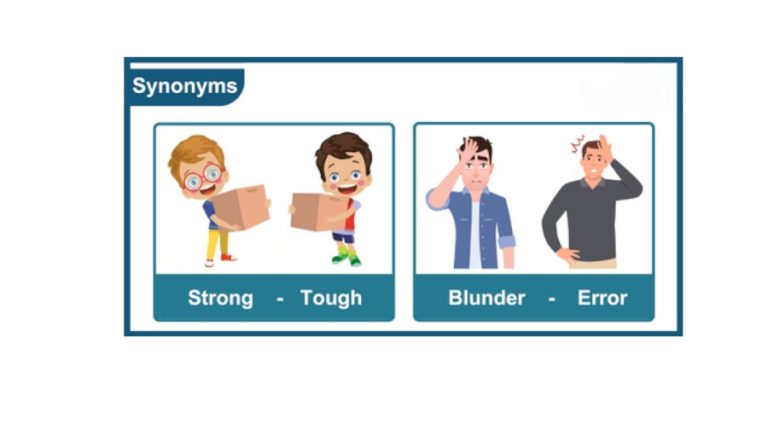Common English Synonyms are a valuable tool for anyone looking to improve their communication skills. Using the right synonym can make your sentences more interesting, expressive, and professional. Whether you are writing an email, preparing an assignment, or chatting with friends, a good grasp of synonyms elevates your language.
For instance, instead of repeatedly using the word “happy,” employing alternatives like “joyful” or “delighted” can make your language more colorful and engaging.
Why Learning Common English Synonyms Matters
Understanding common English synonyms enhances both written and spoken communication. It prevents repetitive language, helps convey precise meanings, and improves comprehension. Students preparing for exams, professionals writing reports, and casual speakers all benefit from incorporating synonyms into their vocabulary.
For example, instead of always using “important,” you might choose “crucial,” “vital,” or “significant,” depending on context. This small adjustment can make your sentences more persuasive and impactful.
Categories of Common English Synonyms
Synonyms can be grouped based on usage and context. Familiarity with these categories helps in selecting the right word for each situation.
Synonyms for Emotions
Emotions are an essential part of communication. Using common English synonyms for emotions can help convey feelings more precisely. Words like:
-
Happy → Joyful, Cheerful, Delighted
-
Sad → Unhappy, Melancholy, Gloomy
-
Angry → Furious, Irritated, Upset
For example, saying “I am delighted with your performance” sounds more refined than just “I am happy with your performance.”
Synonyms for Daily Actions
Daily actions form the core of routine conversations. Using synonyms can make interactions more engaging. Examples include:
-
Walk → Stroll, Saunter, March
-
Eat → Devour, Nibble, Consume
-
Speak → Talk, Chat, Converse
For instance, in a casual conversation, saying “Let’s stroll in the park” sounds more inviting than just “Let’s walk in the park.”
Synonyms for Describing People
Describing people effectively requires varied vocabulary. Common English synonyms can help express traits more vividly:
-
Smart → Intelligent, Clever, Bright
-
Kind → Compassionate, Generous, Considerate
-
Strong → Sturdy, Robust, Powerful
For example, “She is a compassionate person” communicates more warmth than simply saying “She is kind.”
Synonyms for Academic and Professional Use
In formal writing or presentations, using precise synonyms is crucial. Examples include:
-
Important → Significant, Crucial, Essential
-
Improve → Enhance, Refine, Upgrade
-
Help → Assist, Support, Aid
For instance, writing “This strategy is crucial for our project’s success” is more professional than “This strategy is important for our project’s success.”
Tips to Master Common English Synonyms
Learning synonyms is more effective when practiced daily. Here are practical tips:
-
Read books, articles, and newspapers to see synonyms in context.
-
Use a thesaurus, but understand the meaning before applying a new word.
-
Practice writing sentences with new synonyms to reinforce learning.
-
Engage in conversations using varied vocabulary to make it habitual.
Even small daily efforts can significantly improve your grasp of common English synonyms over time.
Real-Life Examples of Synonym Usage
Consider these scenarios to understand the practical use of common English synonyms:
-
In Emails: “We need to enhance our marketing strategy” instead of “We need to improve our marketing strategy.”
-
In Assignments: “The findings are significant for future research” instead of “The findings are important for future research.”
-
In Conversations: “I am thrilled to meet you” instead of “I am happy to meet you.”
These small changes make communication more effective and professional.
Synonyms in Creative Writing
In stories, blogs, or social media posts, varied vocabulary captures the reader’s attention. Writers often replace repetitive words with common English synonyms to maintain flow and engagement.
For example, describing a character as “bright, clever, and witty” paints a fuller picture than just “smart.” Similarly, saying “The garden was serene and tranquil” feels more immersive than simply “The garden was calm.”
Avoiding Misuse of Synonyms
While synonyms enhance communication, misuse can confuse the reader or listener. Understanding subtle differences in meaning is important. For instance:
-
“Big” and “Huge” are synonyms, but “huge” conveys a stronger intensity.
-
“Happy” and “Content” are synonyms, but “content” suggests calm satisfaction rather than excitement.
Always ensure the synonym fits the context to maintain clarity.
Digital Tools for Learning Synonyms
Modern technology makes learning common English synonyms easier. Online dictionaries, thesauruses, and apps provide instant suggestions and examples. Tools like Grammarly and Thesaurus.com help check if your word choice suits the context, making writing more accurate and expressive.
Incorporating Synonyms into Daily Life
To truly master common English synonyms, integrate them into daily routines:
-
Speak: Try replacing simple words with synonyms during conversations.
-
Write: Revise emails, essays, or messages using new synonyms.
-
Listen: Observe how native speakers use varied vocabulary in talks, shows, or podcasts.
Over time, this habit improves fluency and enriches your vocabulary naturally.
Continuous Improvement
Learning common English synonyms is a lifelong journey. With consistent practice, reading, and writing, your ability to choose the right word in any situation will grow. Expanding your vocabulary not only boosts confidence but also enhances personal, academic, and professional communication.
By understanding, practicing, and applying these synonyms regularly, you can transform ordinary sentences into impactful and expressive communication, making your language more engaging and versatile.
Read also:
success synonyms
support synonym
selenophile meaning in hindi
what is a femcel
